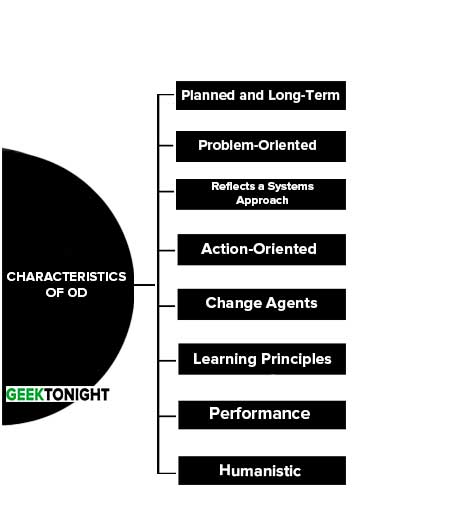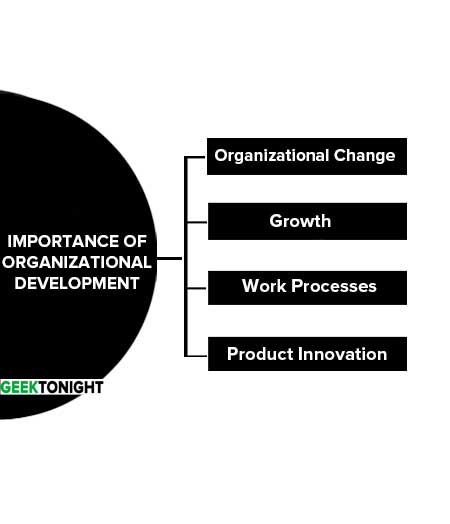What is Organisational Development?
Organization development (OD) is a planned approach to respond effectively to changes in its external and internal environment.
Essentially there are two schools of thought in OD:
- Programmed – Procedure School
- System – Process School
The Programmed – Procedure School
It is an older approach. According to it, OD is the effective implementation of the organization’s policies, procedures and programmers.
It is concerned with
- personnel activities that contribute to the overall growth
- development of the organization, such as recruitment, training, career development, compensation, welfare and benefits, labour relations etc.
The System Process School
This school considers organization development in the context of both its internal and external environment. Proponents of this approach view organization as a system which can be changed and developed to best achieve its goals and objectives.
Table of Content
- 1 What is Organisational Development?
- 2 Organizational Development Definition
- 3 Organizational Development Meaning
- 4 Concept of Organizational Development
- 5 Characteristics of Organizational Development
- 6 Objectives of Organizational Development
- 7 Importance of Organizational Development
- 8 Organizational Development Process
- 9 Human Resources Tutorial
- 10 Human Resource Management
Organizational Development Definition
According to Richard Beckhard, organisation development, is defined as:
- A planned effort
- Organisation-wide
- Managed from the top
- To increase organisation effectiveness and health
- Through planned interventions in the organisation’s ‘processes’, using behavioural science knowledge.
OD is a systematic application of behavioural science knowledge to the planned development and reinforcement of organisational strategies, structures and processes for improving an organisation’s effectiveness. – Cummings and Worley (1993)
Organisation Development (OD) is a complex strategy intended to change the beliefs, attitudes, values, and structure of organisations so that they can better adapt to new technologies, markets, and challenges. – Warren Bennis
Organizational Development Meaning
In Organization Development (OD), O represents Organizations i.e. Systems of all kinds; the units throughout society that are human organizations existing to accomplish some purpose.
D represents Development is about change & improvement; growing towards something, getting better at one’s mission, improving how work gets done & people live their lives.
Concept of Organizational Development
The three main concept of organizational development (OD) are:
- Organizational Climate
It is defined as the mood or unique “personality” of an organization.
Some of the climate features and characteristics may be associated with;
• employee satisfaction, stress, service quality and outcomes and successful application of new processes. - Organizational Culture
It is a system of shared assumptions, values, and beliefs, which governs how people behave in organizations. These shared values have a strong influence on the people in the organization and dictate how they dress, act, and perform their jobs.
The five basic elements of culture include:
• Assumptions
• Values
• Behavioral Norms
• Behavioral Patterns
• Artifacts - Organizational Strategy
It is the sum of the actions a company intends to take to achieve long-term goals. Together, these actions make up a company’s strategic plan.
Strategic plans take at least a year to complete, requiring involvement from all company levels. The improvement consists of four steps:
• Diagnosis
• Action Planning
• Intervention
• Evaluation
Characteristics of Organizational Development
The following conclusions can be drawn about the core characteristics of organizational development OD:
- Planned and Long-Term
- Problem-Oriented
- Reflects a Systems Approach
- Action-Oriented
- Change Agents
- Learning Principles
- Performance
- Humanistic

Planned and Long-Term
OD is a data-based approach to change that involves all of the ingredient that go into managerial planning. It involves goal setting, action planning, implementation, monitoring, and taking corrective action when necessary.
Problem-Oriented
OD attempts to apply theory and research from a number of disciplines including behaviourals science, to the solution of organizational problems.
Reflects a Systems Approach
OD is both systemic and systematic. It is a way of more clearly linking the human resources and potential of an organization to its technology, structure, and management processes.
Action-Oriented
OD focuses on accomplishments and results. Unlike approaches to change that tend to describe how organizational change takes place, OD’s emphasis is on getting things done.
Change Agents
The process requires the facilitative role of a change agent to assist the organization in redirecting its functioning.
Learning Principles
OD’s basic feature is a reliance on re-education to bring about change. Re-education involves applying fundamental learning principles.
Performance
OD programs include an emphasis on ways to improve and enhance performance and quality (TQM).
Humanistic
OD relies on a set of humanistic values about people and organizations that aims at gaining more effective organizations by opening up new opportunities for increased use of human potential systems.
Objectives of Organizational Development
The important Objectives of Organizational Development are:
- OD represents a viable strategy for improving organisation effectiveness and enhancing the quality of work-life of members.
- It makes organisation better able to achieve both the goals of the organisation and goals of individuals within the organisation. OD helps solve problems that adversely affect the operational efficiency at all levels.
- OD keeps work organisation productive as well as hospitable for members.
- It is a strategy for intelligently facing the requirements of changing world and coping up effectively the environment. Its focus is on developing total organisation.
- OD is a collaborative management of organisational culture (beliefs and values).
- OD is far different from “efficiency system” introduced to speed up production in the past.
- OD is a collaborative effort by the members of an organisation to develop their capabilities so that organisation can attain an optimum level of performance.
Importance of Organizational Development
Organizational development is the use of organizational resources to improve efficiency and expand productivity. It can be used to solve problems within the organization or as a way to analyze a process and find a more efficient way of doing it. Implementing organizational development requires an investment of time and money.
So, below are some of the importance of organizational development (OD).

Organizational Change
The process of organizational development identifies areas of company operations where change is needed. Each need is analyzed, and the potential effects are projected into a change management plan.
The plan outlines the
- specific ways in which the change will improve company operations
- which will be affected by the change
- how it can be rolled out efficiently to employees.
Without organizational development as part of change management, a company would have a difficult time developing effective change management programs.
Growth
Organizational development is an important tool in managing and planning corporate growth.
An organizational development analysis brings
- together sales projections
- consumer demand to help determine the rate of company growth
This information is used to alter the company business plan and plan the expansion and use of company resources such as personnel and the distribution network to accommodate future growth.
Work Processes
When a company is involved in organizational development, it analyzes work processes for efficiency and accuracy. Any quality control measures required to attain company standards are put in place.
Evaluators analyze a duplicate process or processes that can be combined for greater efficiency, and develop and implement detailed plans on how to improve company methods.
Product Innovation
Product innovation requires the analysis of several kinds of information to be successful.
Organizational development is critical to product innovation because it can help analyze each element of product development and create a method for using it effectively.
Some of the processes that come together in organizational development to assist in product innovation are:
- competitive analysis
- technology development
- consumer preferences
- target market research
- manufacturing capabilities analysis
- patents and trademarks
Organizational Development Process
Kurt Lewin (1947) conceptualised social change as occurring in three phases:
(a) unfreezing
(b) changing
(c) refreezing.
Typical organisation development process implemented by one leading Indian company is presented in four stages summarised in Figure.

The Diagnostic Phase
First, stage of process of organisation development is diagnostic phase:
- Client’s top management to recognise the awareness of the problems of the need for change in the organisation.
- The engagement of change agent or consultant organisation and have by the client.
- Diagnosis in OD is a collaborative process, which involves the client system and consultant’s joint collection and analysis of data. Emphasis is on a continuous and participative diagnosis.
- OD consultant may make use of tools such as questionnaire (survey) and interview schedules (consultation meetings).
In brief, OD diagnosis attempts to analyse the current state of the organisation in terms of various structures, systems and process in order to identify actual and potential strengths and weaknesses.
Action Plan/Strategy Development
Second, stage of organisation development process is action plan:
- Sharing of joint diagnosis of problems by the consultant and client team to the top management in an OD workshop.
- In this workshop, top management jointly develops action plans and strategies in the form of interventions (e.g. team building and OD grid, etc.) to bring about changes or improvement.
Implementation of Interventions
Third, stage of organisation development process is the implementation of interventions:
- Implementation of action plans-changes through intervention.
- Long-drawn series of actions that may last several months such as grid OD intervention of Blake and Mouton.
- This phase of interventions of OD process takes place under conditions of unfrozenness, mobilising efforts, which is necessary for changes to have an impact.
- Allowing changes to stabilise and to permeate the culture of the organisation. To ensure that the positive element of the change programme are diffused to other parts of the organisation.
Feedback of Changes, Evaluation and Making Modification Phase
- This phase consists of monitoring and reviewing the progress of the actions by collecting feedback about the changes introduced.
- Making modification in case of need arises. Mid-course corrections.
- In case some new problems are revealed in the collection of data (survey/consultation process) another phase is commenced.
- To achieve complete success, it has to be ensured client team is competent enough to maintain the changed system without the support of the consultant, as there is a tendency among organisations to revert to their original states. A consultant can thus withdraw.
- OD practitioners, both internal and external consultants may counsel decision-makers on an individual basis, to work on improving working relationships among the members of group or team.
OD is a long-range effort to improve an organisation’s problem-solving and renewal processes, particularly through more effective and collaborative management of organisation culture-with special emphasis on the culture of formal work teams-with the assistance of change agent and technology of applied behavioural science, including action research.
Reference
- Cummings, Thomas G., & Worley, Christopher G. (2000), Organisation
Development and Change, 7th ed., South-Western Educational Publishing. - French, Wendell L., and Cecil H. (1996), Development: Behavioral Science Interventions for Organisation Improvement (5th Edition), New Delhi, India: Prentice-Hall of India.
- Hatch, Mary J. (1997), Organisation Theory, New York: OUP
- Singh,Kavita, Organisation Change and Development, Excel Books Private Limited.
Human Resources Tutorial
(Click on Topic to Read)
Human Resource Management
Go On, Share & Help your Friend
Did we miss something in Organization Development Tutorial or You want something More? Come on! Tell us what you think about our post on What is Organizational Development Process, Meaning, Concept, Objectives, Example| Organizational Development in the comments section and Share this post with your friends.
Human Resources Tutorial
(Click on Topic to Read)







